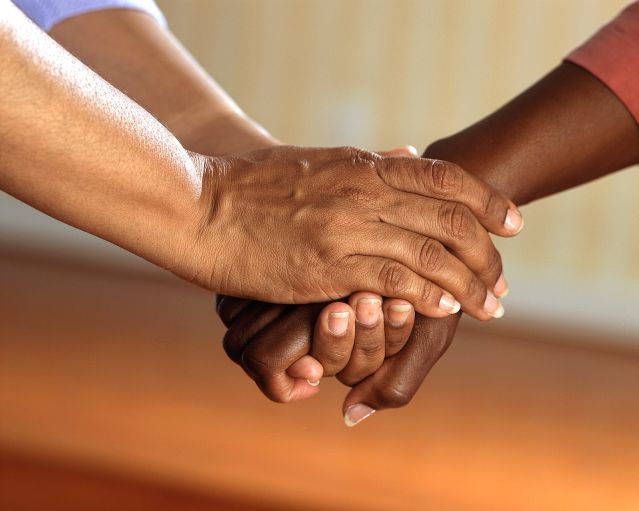Fear
Why It's So Hard to Ask for Help
Asking for help means admitting that you need it.
Posted August 1, 2023 Reviewed by Abigail Fagan
Key points
- Refusing to ask for help suggests a kind of arrogance—that it isn't worth the vulnerability.
- People often resist asking for help because there may be implications about perceived shortcomings.
- When asking for help, don't ask generally, but tell others exactly what you need.

The slope of the beach appeared to drop off steeply about 10 feet from shore, but when I ran down the beach and dived in, I discovered—a little too late—that it was only the illusion of depth. In fact, it was merely the sand changing color from light to dark. I landed hard on my elbows in that bright water in the Gulf of Mexico, my legs flipped indecorously over my head, and I both heard and felt an ominous sound somewhere between a crack and a tear.
I spent the next month flat on my back, lying on a hot grill of torn ligaments. I filed my stories to the newspaper from the floor of my living room, which slowly began piling up with pizza boxes, dirty clothing and dishes, books and papers, and an odor most commonly associated with locker rooms. One day, several weeks into this prostration, a friend came by unannounced and peeked in the window. When he tapped on the glass, I craned my neck and saw, framed by the dirty windowpane, an expression that roughly translated to “WTF?”
When I told him what had happened, he was genuinely angry with me, for being too stubborn to call him, or anyone, for help. I hadn’t told anyone of my accident, hadn’t called anyone to come cook me a meal or do a load of laundry or go food-shopping for me or rub my spasming back muscles or even just say "there, there.”
“What the hell are friends for?” he scolded as he began picking up pizza boxes and dirty clothing. “What were you thinking?”
I was thinking what a lot of people think when they refuse to reach out for help. I was thinking of my pride. I didn’t want anyone seeing me in that condition—laid up, flat out, down on the mat. Not even someone who was in a support group with me, as this friend was.
It was the part of me that needed to appear in control, hated to be vulnerable, and prided himself on independence; the part that was afraid to test the tensile strength of friendship, afraid it might give out under too much strain, afraid to even find out how much was too much. In that moment, pinioned in my friend’s gaze, I remembered my father insisting that I not fly to New York to visit him after his heart attack, and like an idiot I listened to him. Only much later did he admit that he shouldn't have told me not to come, that he was, as he put it, “being the Stoic, not wanting you to see me that way.” He used to call me “a chip off the old block,” and rightly so.
The refusal to ask for help is a kind of sickness in itself, even a kind of arrogance—the blind insistence on doing it all by yourself, no matter what—because along with it comes the message that no one’s help is worth the price in vulnerability it will cost you, that ultimately no one can console you, no one can ease your pain, if you yourself can’t. But such cussedness betrays a tremendous lack of faith in others, in the leathery stamina of love, and in your own ability to survive embarrassment.
Not that there’s nothing to fear. Asking for help is formidable, and requires that you lower the drawbridge. We seem to naturally resist help and advice, with its implication of our shortcomings, and this may be especially so for men, because vulnerability is generally bred out of us at an early age. Although more women than men tend to seek counseling, take classes, read books and ask questions, for most of us seeking help is not pleasant, advice not necessarily easy to take, and guidance often points out the error of our ways, as anyone who’s ever entered couples counseling can attest to.
First you have to admit that you need help, which takes either some guts or enough desperation that you don’t care anymore what others think. Then you have to admit your need to someone else, and allow that person to have some say and some sway in your affairs. Unfortunately, many of us are reluctant to let others guide us, knowing how easily people can fall to acting like amateur preachers and psychotherapists, trying to heal, convert and fix us, imagining themselves the instruments of our deliverance and the answer to our prayers, taking as their motto Gore Vidal’s comment that “there is no human problem which could not be solved if people would simply do as I advise.”
The fact is, you need a working set of green lights and red lights when taking on helpers. Tell others what you need. If you don’t specify, if you just tell people that you need help, or that you feel stuck, they’re likely to try to diagnose what sort of help you seem to need, and administer it however they see fit. Don’t give anyone that much rope. Tell them exactly what you need. “I need you to go grocery shopping for me. I need a referral to a good couples counselor. I need people to interview who have succeeded at freelancing.”
Also, keep in mind that most people want to know that the help they offer will be appreciated and put to good use, especially if it’s a bigger ask than just going grocery shopping for you in a pinch—say professional, financial or emotional help. People don’t need a ticker-tape parade, but an offer of thanks goes a long way as a gesture of gratitude. And be a little strategic. Give some thought to what someone will gain from helping you, whether it’s emotional, spiritual, or practical.
Few people understand the dynamics of asking for help better than a man I met years ago named Percy Ross. He used to receive 2,000 letters a day from people asking for his help, through a newspaper column he syndicated in more than 700 newspapers called Thanks A Million, through which this Minneapolis millionaire (since passed away) tried to dispose of the fortune it took him nearly 60 years to accumulate, working to redistribute his wealth among people who wrote to him with their stories of need (and sometimes greed). Those that touched him he responded to with a check, a brand of philanthropy he considered “investing in people.”
“But I don’t give to self-centered individuals or causes,” he once told me. “Few people do. I want to know how the fulfillment of a request will help others as well as yourself. It’s also easier to ask for help if you feel like you’re serving a worthy cause, something bigger than just yourself. So give me some evidence that the help I offer will make a real difference.” Something like the following letter he received:
“Dear Mr. Ross, I’m imprisoned in Arkansas, and have been writing a book about the effectiveness of punishment and the social reaction to crime. I’m doing everything in my power to better myself while incarcerated. I’ve alienated my family and have no friends. That’s my past, though, not my future. What I would like most is a good dictionary to help me in my writing. Believe it or not, this would be the most wonderful asset in the world right now to me, next to freedom. J.G.W., Tucker, AR.”
Along with a dictionary, Ross wrote, “You’ve been faced with a bad situation and turned it into a positive experience. More power to you! When your book gets published, I’d like to buy a copy. Good luck!”
I’ve always been fascinated by the “Acknowledgments” pages at the beginning of books, in which authors thank those who gave them help along the way, and what sort of help was most important to them. It’s a clear, consistent indication of the kinds of help that are of the greatest value to people when they're pursuing the most ambitious undertakings of their lives. These include: “Those who believed in me.....who engaged me in soul talk.....who listened.....who helped bring clarity to my thinking.....who gave me the time to work.....who took an interest in my progress.....who restored me with their high spirits.....who never let go of their end of the rope.”




